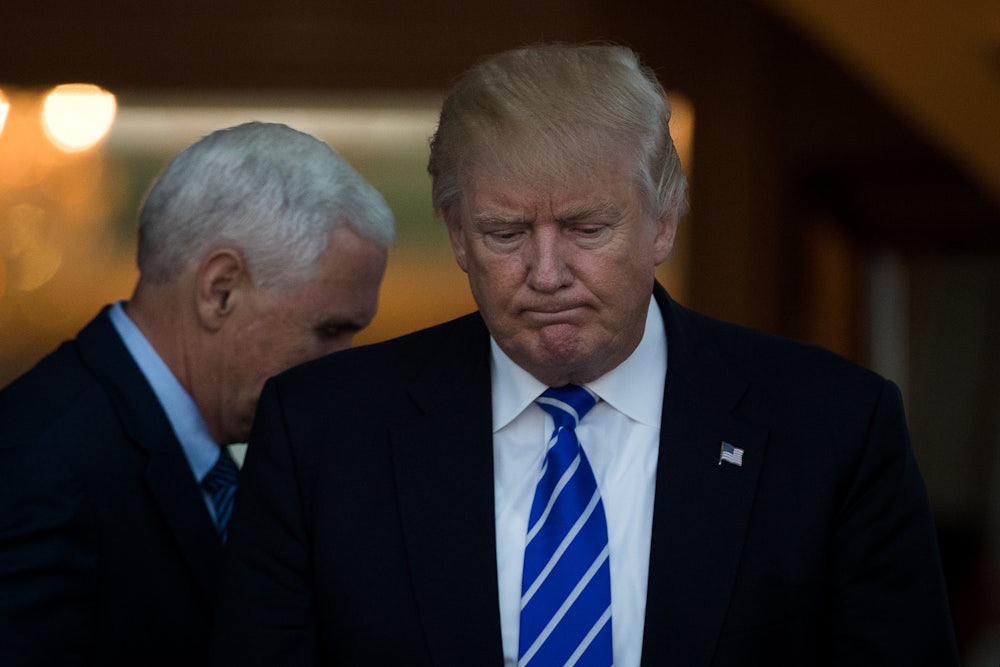Liberals, and even many conservatives, are finding some relief in the hearings for President-elect Donald Trump’s cabinet, as nominee after nominee repudiates his most extreme and heterodox positions. The New York Times last week unexpectedly endorsed retired General James Mattis as secretary of defense, writing, “It was encouraging that he had no qualms in stating views at odds with positions Mr. Trump campaigned on”—notably his wariness of Russia, strong support for NATO and other alliances, willingness to adhere to the nuclear treaty with Iran, and seeming acceptance of female, gay, and transgender troops.
Secretary of State–designate Rex Tillerson, meanwhile, disagrees with Trump’s friendly overtures to Russia, his false claim that climate change is a hoax, and his suggestion that nations like Japan should acquire nuclear weapons. Proposed CIA head Michael Pompeo also said he accepts the reality of climate change. And a raft of nominees—including Tillerson, Attorney General–designate Jeff Sessions, and proposed Homeland Security chief John F. Kelly—have all distanced themselves from Trump’s proposal to ban Muslim immigrants.
The optimistic response to this manifold divergence is that Trump’s administration will not be as radical as many fear. “The Senate should take away from this that personnel will truly be policy,” Hot Air’s Ed Morrissey argued, “and that while Trump might push the rhetorical boundaries, his Cabinet officials will take a more traditional path.”
But this reassuring assessment isn’t the only possibility. It’s also possible that the differences between Trump and his cabinet are more rhetorical than anything. The Washington Post’s Chris Mooney noted that, while Tillerson and Pompeo acknowledge the scientific consensus on climate change, they have “a tendency to either avoid full engagement with the issue or to minimize it.” This “could mean that in practice, as the Trump administration governs, we will see something like what happened under George W. Bush: The issue may be acknowledged at times, but not treated with a lot of urgency.” In other words, these cabinet members may well support policies that, either actively or passively, are in line with climate deniers like Trump.
Another possibility, especially on the international stage, is that mixed signals could stir confusion and even strife. Trump has taken a belligerent stance with China, calling on it to do more to curb North Korea’s nuclear program, saying that the longstanding One China policy is negotiable, threatening a trade war, and warning about its building islands on the South China Sea—all of which has caused Chinese state media to raise the specter of war. Tillerson has echoed some of Trump’s hawkishness on China, but in modulated ways, and on the issue of North Korea he takes a very different line: that the United States has to be “clear-eyed” in what can realistically be expected from the Chinese government. If relations between China and the U.S. deteriorate, as seems likely, there will be the added problem of who the Chinese government tries to engage with in their negotiations. Will they think the relatively conciliatory Tillerson is setting policy, in which case changing policy on North Korea can be regarded as secondary? Or will they believe Trump is driving policy, in which case they will go into negotiations with greater pessimism about finding common ground?
If the Chinese government listens to Tillerson, it’ll be clear that the word of the American president carries little weight. If they listen to Trump, they’ll conclude that their relationship with the U.S. can’t be fixed. Both outcomes are troubling.
U.S. policy toward Russia has the greatest potential for disaster. Given the growing anti-Russia sentiment on Capitol Hill and the Pentagon, strengthened by reports of Russian interference in the election, Mattis might feel more beholden to hawks in Congress than the president he’ll serve under. In fact, Mattis might feel the need to take a firmer line against Russia to compensate for Trump’s gestures of friendship to Vladimir Putin.
The danger is that Putin will see Trump’s victory as an irresistible window of opportunity to test the fragility of NATO, only to encounter Mattis-led resistance. If so, conflict with Russia becomes more likely, not less.
Back in 1950, the U.S. sent mixed messages about its relationship with South Korea. Formally, the Truman administration was committed to a policy of containment of communism, but in speech that year, Secretary of State Dean Acheson failed to mention the country in describing the U.S.’s “defensive perimeter” in Asia. Dispatches between the U.S. and its embassy in Moscow, which were intercepted by the Soviets, also suggested that South Korea was a low priority. As a result, Soviet dictator Joseph Stalin made the made miscalculation that he could greenlight a North Korean invasion of South Korea, with little risk of American resistance. So began the Korean War.
With U.S. troops recently sent to NATO ally Poland for the first time, which a Kremlin spokesman described as “a threat to us,” it’s easy to imagine Putin making a comparable mistake of trying to coerce the Baltic nations to rejoin the Russian sphere of influence, only to discover that the move backfires. If the Russians become more aggressive in Europe, there will be powerful forces in America, ranging from both parties in Congress to the Pentagon to Trump’s own secretary of defense, who will push the president to take a hardline stance. Like Stalin, Putin could provoke a war by mispredicting the American reaction.
There is always bound to be some divergence between a president and his cabinet, but the Trump administration is shaping up to create a genuinely new problem: an anarchic government where the world is not sure who is setting policy. Trump believes he can be successful by sowing chaos and confusion, which is true to the extent that he won the White House with a shambolic campaign in which he took many contradictory stances. But being a statesman is different than being a politician. The incoherence that benefited him as a politician might lead to war as a president.
